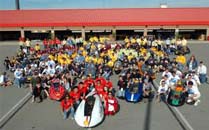Solar might shine more brightly at 2013 Sheel Eco-Marathon
 Solar hasn’t played a strong role in the annual Shell Eco-Marathon, a competition between high school and university student teams to see who can achieve the greatest vehicle fuel efficiency.
Solar hasn’t played a strong role in the annual Shell Eco-Marathon, a competition between high school and university student teams to see who can achieve the greatest vehicle fuel efficiency.
Only eight of the 112 teams that participated in the challenge March 27 through April 2 in Houston, Texas were powered by solar.
It’s a hard power source to rely on exclusively, said Adrian Jurgens, technical manager for the Eco-Marathon
“It requires the sun to be out,” Jurgens said. “And cloudy years like this one and then some years it’s been raining and they haven’t even been able to compete.”
Next year, Jurgens said race organizers have decided to eliminate the solar category of the race and allow teams to incorporate solar into their electric and battery-powered vehicles instead.
“It adds a technical challenge,” he said.
It also adds an advantage and could lead to much higher mileage per gallon equivalents. Maeter De High School won the race this year with the equivalent of 2,188.6 miles per gallon.
The team achieved that with a gas-powered engine in the prototype class, which features futuristic vehicles in different shapes and sizes.
While impressive, that was significantly lower than last year’s winner, Université Laval in Quebec, Canada. That team won with 2,564.8 miles per gallon in the gas-powered category.
Jurgens said there are several explanations for the lower fuel efficiency this year. For one, the Universite Laval was sidelined by technical difficulties and couldn’t compete. But more likely, Jurgens said it was the race itself.
There were 112 competitors on the track this year, compared to just 69 last year.
“Because of that, the drivers were braking a lot more often,” Jurgens said. “And anytime you slow down and start back up again, it uses more energy.”
Mater Dei High School, who won the prototype competition, also entered a vehicle in the urban class, which includes cars that look more like contemporary vehicles.
Despite the absence of solar-powered competition, Purdue University won the Urban Class with an all-solar car.
Purdue’s solar vehicle was the only solar car that finished the race with positive energy flow, Jurgens said, meaning the car ran off the sun’s energy without depleting the battery.
said he looks forward to seeing what teams bring next year – how they will incorporate solar into their electric vehicle designs.



